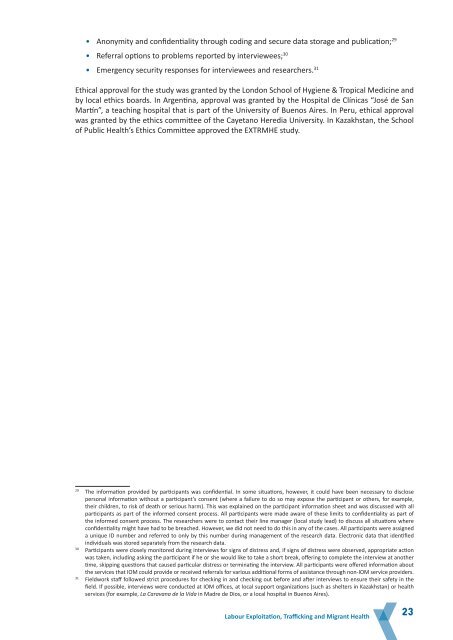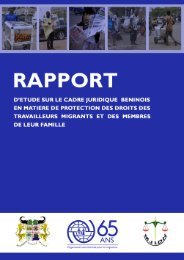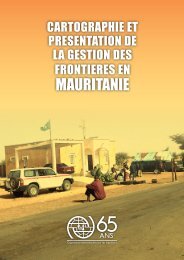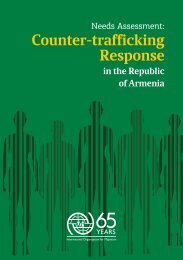Labour Exploitation Trafficking and Migrant Health
labour_exploitation_trafficking_en_0
labour_exploitation_trafficking_en_0
Create successful ePaper yourself
Turn your PDF publications into a flip-book with our unique Google optimized e-Paper software.
• Anonymity <strong>and</strong> confidentiality through coding <strong>and</strong> secure data storage <strong>and</strong> publication; 29<br />
• Referral options to problems reported by interviewees; 30<br />
• Emergency security responses for interviewees <strong>and</strong> researchers. 31<br />
Ethical approval for the study was granted by the London School of Hygiene & Tropical Medicine <strong>and</strong><br />
by local ethics boards. In Argentina, approval was granted by the Hospital de Clínicas “José de San<br />
Martín”, a teaching hospital that is part of the University of Buenos Aires. In Peru, ethical approval<br />
was granted by the ethics committee of the Cayetano Heredia University. In Kazakhstan, the School<br />
of Public <strong>Health</strong>’s Ethics Committee approved the EXTRMHE study.<br />
29<br />
The information provided by participants was confidential. In some situations, however, it could have been necessary to disclose<br />
personal information without a participant’s consent (where a failure to do so may expose the participant or others, for example,<br />
their children, to risk of death or serious harm). This was explained on the participant information sheet <strong>and</strong> was discussed with all<br />
participants as part of the informed consent process. All participants were made aware of these limits to confidentiality as part of<br />
the informed consent process. The researchers were to contact their line manager (local study lead) to discuss all situations where<br />
confidentiality might have had to be breached. However, we did not need to do this in any of the cases. All participants were assigned<br />
a unique ID number <strong>and</strong> referred to only by this number during management of the research data. Electronic data that identified<br />
individuals was stored separately from the research data.<br />
30<br />
Participants were closely monitored during interviews for signs of distress <strong>and</strong>, if signs of distress were observed, appropriate action<br />
was taken, including asking the participant if he or she would like to take a short break, offering to complete the interview at another<br />
time, skipping questions that caused particular distress or terminating the interview. All participants were offered information about<br />
the services that IOM could provide or received referrals for various additional forms of assistance through non-IOM service providers.<br />
31<br />
Fieldwork staff followed strict procedures for checking in <strong>and</strong> checking out before <strong>and</strong> after interviews to ensure their safety in the<br />
field. If possible, interviews were conducted at IOM offices, at local support organizations (such as shelters in Kazakhstan) or health<br />
services (for example, La Caravana de la Vida in Madre de Dios, or a local hospital in Buenos Aires).<br />
<strong>Labour</strong> <strong>Exploitation</strong>, <strong>Trafficking</strong> <strong>and</strong> <strong>Migrant</strong> <strong>Health</strong><br />
23





